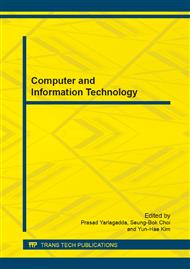[1]
S. Ilarri, E. Mena, A. Illarramendi, Using cooperative mobile agents to monitor distributed and dynamic environments, Information Sciences, vol. 178, no. 9, pp.2105-2127, (2008).
DOI: 10.1016/j.ins.2007.12.015
Google Scholar
[2]
I. D. Schizas, G. Mateos, G. B. Giannakis, Distributed LMS for consensus-based in network adaptive processing, IEEE Transactions on Signal Processing , vol. 57, no. 6, pp.2365-2382, (2009).
DOI: 10.1109/tsp.2009.2016226
Google Scholar
[3]
A. Rakotomamonjy, Surveying and comparing simultaneous sparse approximation (or group-lasso) algorithms, Signal processing, vol. 91, no. 7, pp.1505-1526, (2011).
DOI: 10.1016/j.sigpro.2011.01.012
Google Scholar
[4]
Z. Qin, K. Scheinberg, D. Goldfarb, Efficient block-coordinate descent algorithms for the Group Lasso., Mathematical programming computation, vol. 5, no. 2, pp.143-169, (2013).
DOI: 10.1007/s12532-013-0051-x
Google Scholar
[5]
F. Zeng, C. Li, Z, Tian, Distributed compressive spectrum sensing in cooperative multihop cognitive networks, IEEE Journal of Selected Topics in Signal Processing, vol. 5, no. 1, pp.37-48, (2011).
DOI: 10.1109/jstsp.2010.2055037
Google Scholar
[6]
J. A. Bazerque, G. Mateos, G. B. Giannakis, Group-lasso on splines for spectrum cartography, IEEE Transactions on Signal Processing, vol. 59, no. 10, pp.4648-4663, (2011).
DOI: 10.1109/tsp.2011.2160858
Google Scholar
[7]
Q. Ling, Z. Tian, Decentralized support detection of multiple measurement vectors with joint sparsity, in 2011 IEEE International Conference on Acoustics, Speech and Signal Processing (ICASSP), pp.2996-2999, (2011).
DOI: 10.1109/icassp.2011.5946288
Google Scholar
[8]
J. Zhu, Y. Li, M. Xue, et al. A lightweight decentralized algorithm for jointly sparse optimization, in IEEE 2013 32nd Chinese Control Conference (CCC), pp.4666-4670, (2013).
Google Scholar
[9]
Q. Ling, Z. Wen, and W. Yin, Decentralized Jointly Sparse Recovery by Reweighted Lq Minimization, IEEE Transactions on Signal Processing, vol. 61, no. 5, pp.1165-70, (2013).
DOI: 10.1109/tsp.2012.2236830
Google Scholar
[10]
E. Candes, M. Wakin, S. Boyd, Enhancing sparsity by reweighted ℓ1 minimization, Journal of Fourier Analysis and Applications, vol. 14, pp.877-905, (2008).
DOI: 10.1007/s00041-008-9045-x
Google Scholar
[11]
S. F. Cotter, B. D. Rao, K. Engan, et al., Sparse solutions to linear inverse problems with multiple measurement vectors, IEEE Transactions on Signal Processing, vol. 53, no. 7, pp.2477-2488, (2005).
DOI: 10.1109/tsp.2005.849172
Google Scholar
[12]
M. Yuan, Y. Lin, Model selection and estimation in regression with grouped variables, Journal of the Royal Statistical Society: Series B (Statistical Methodology), vol. 68, no. 1, pp.49-67, (2006).
DOI: 10.1111/j.1467-9868.2005.00532.x
Google Scholar
[13]
D. P. Bertsekas, J. N. Tsitsiklis, Parallel and Distributed Computation: Numerical Methods, Englewood Cliffs, NJ: Prentice-Hall, 1989, Mass. Inst. of Technol.
DOI: 10.1177/109434208900300408
Google Scholar
[14]
B. D. Rao, K. Engan, S. F. Cotter, et al., Subset selection in noise based on diversity measure minimization, IEEE Transactions on Signal Processing, vol. 51, no. 3, pp.760-770, (2003).
DOI: 10.1109/tsp.2002.808076
Google Scholar


